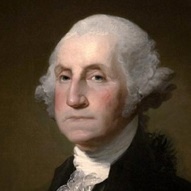Carl’s Conservative Corner
George Washington’s Farewell to the Nation and Commentary by Carl Episode 5
 Source: The Independent Chronicle, September 26, 1796
Source: The Independent Chronicle, September 26, 1796
George Washington
United States – September 17, 1796
To the People of the United States
FRIENDS AND FELLOW-CITIZENS:
27 Of all the dispositions and habits, which lead to political prosperity, Religion and Morality are indispensable supports. In vain would that man claim the tribute of Patriotism, who should labor to subvert these great pillars of human happiness, these firmest props of the duties of Men and Citizens. The mere Politician, equally with the pious man, ought to respect and to cherish them. A volume could not trace all their connexions with private and public felicity. Let it simply be asked, Where is the security for property, for reputation, for life, if the sense of religious obligation desert the oaths, which are the instruments of investigation in Courts of Justice? And let us with caution indulge the supposition, that morality can be maintained without religion. Whatever may be conceded to the influence of refined education on minds of peculiar structure, reason and experience both forbid us to expect, that national morality can prevail in exclusion of religious principle.
28 It is substantially true, that virtue or morality is a necessary spring of popular government. The rule, indeed, extends with more or less force to every species of free government. Who, that is a sincere friend to it, can look with indifference upon attempts to shake the foundation of the fabric ?
29 Promote, then, as an object of primary importance, institutions for the general diffusion of knowledge. In proportion as the structure of a government gives force to public opinion, it is essential that public opinion should be enlightened.
Carl’s Comments on Paragraphs 27-29
In this section Washington’s views fly squarely in the face of today’s progressive agenda. I will let his words speak for themselves, “Of all the dispositions and habits, which lead to political prosperity, Religion and Morality are indispensable supports. In vain would that man claim the tribute of Patriotism, who should labor to subvert these great pillars of human happiness, these firmest props of the duties of Men and Citizens. The mere Politician, equally with the pious man, ought to respect and to cherish them. A volume could not trace all their connexions with private and public felicity. Let it simply be asked, Where is the security for property, for reputation, for life, if the sense of religious obligation desert the oaths, which are the instruments of investigation in Courts of Justice? And let us with caution indulge the supposition, that morality can be maintained without religion. Whatever may be conceded to the influence of refined education on minds of peculiar structure, reason and experience both forbid us to expect, that national morality can prevail in exclusion of religious principle.”
The moral principles that Washington insisted are the indispensable supports or pillars are those found in the Bible. Washington uses a questioning format to state that these Biblical, moral principles are the basis for legal justice: where the right to own and enjoy private property, where the opportunity to defend one’s reputation from accusation, and where the freedom to enjoy life itself find there basis..
There is much rhetoric about the “separation of Church and State” and this statement seems to be repeated endlessly today. Do you know that this is not contained in the Constitution? The quote is found only in a letter response by Thomas Jefferson. The First Amendment starts with these words, “Congress shall make no law respecting an establishment of religion, or prohibiting the free exercise thereof.” While Congress has not enacted such a law, the Judicial Branch has certainly brought forth many rulings that have had the effect of creating strict limitation on the free exercise of religion.
It may help us gain perspective of just what an establishment of religion by Congress would look like by understanding that at the time of independence, in Britain, the Church of England, was the only legal church, the King as its head of the country AND the church.. The Church of England was the instrument of religious based persecution that caused the Puritans and others to flee England and head to the New World. Many, if not most, of the Founding Fathers held leadership positions in various Protestant churches. They could not have fathomed a time when a group like the Freedom From Religion would exist.
This entire section could not be clearer, no wonder the school study of this Farewell Address has been eliminated in public schools.
If you would like to comment, please use social media channels.
 Source: The Independent Chronicle, September 26, 1796
Source: The Independent Chronicle, September 26, 1796